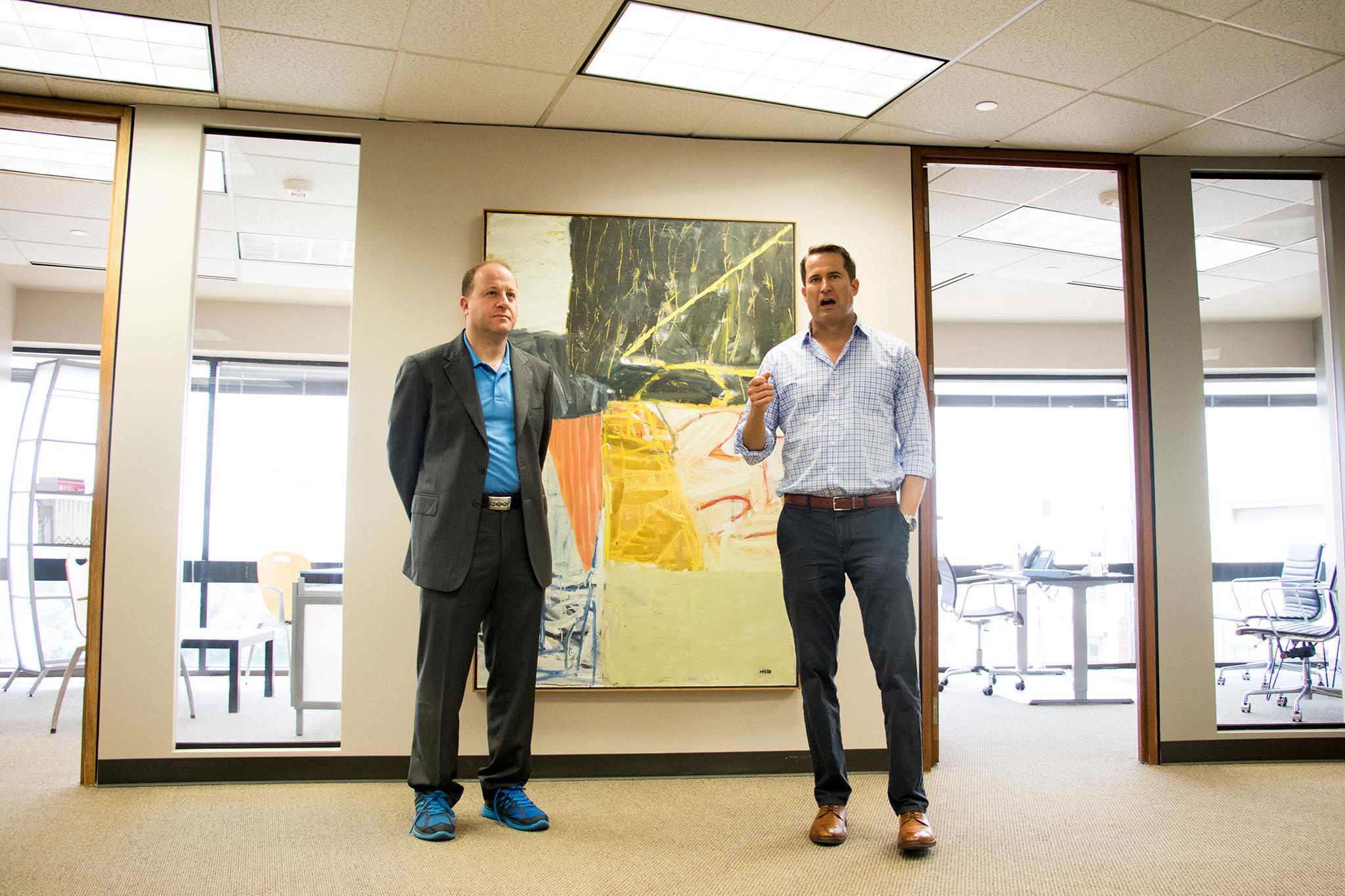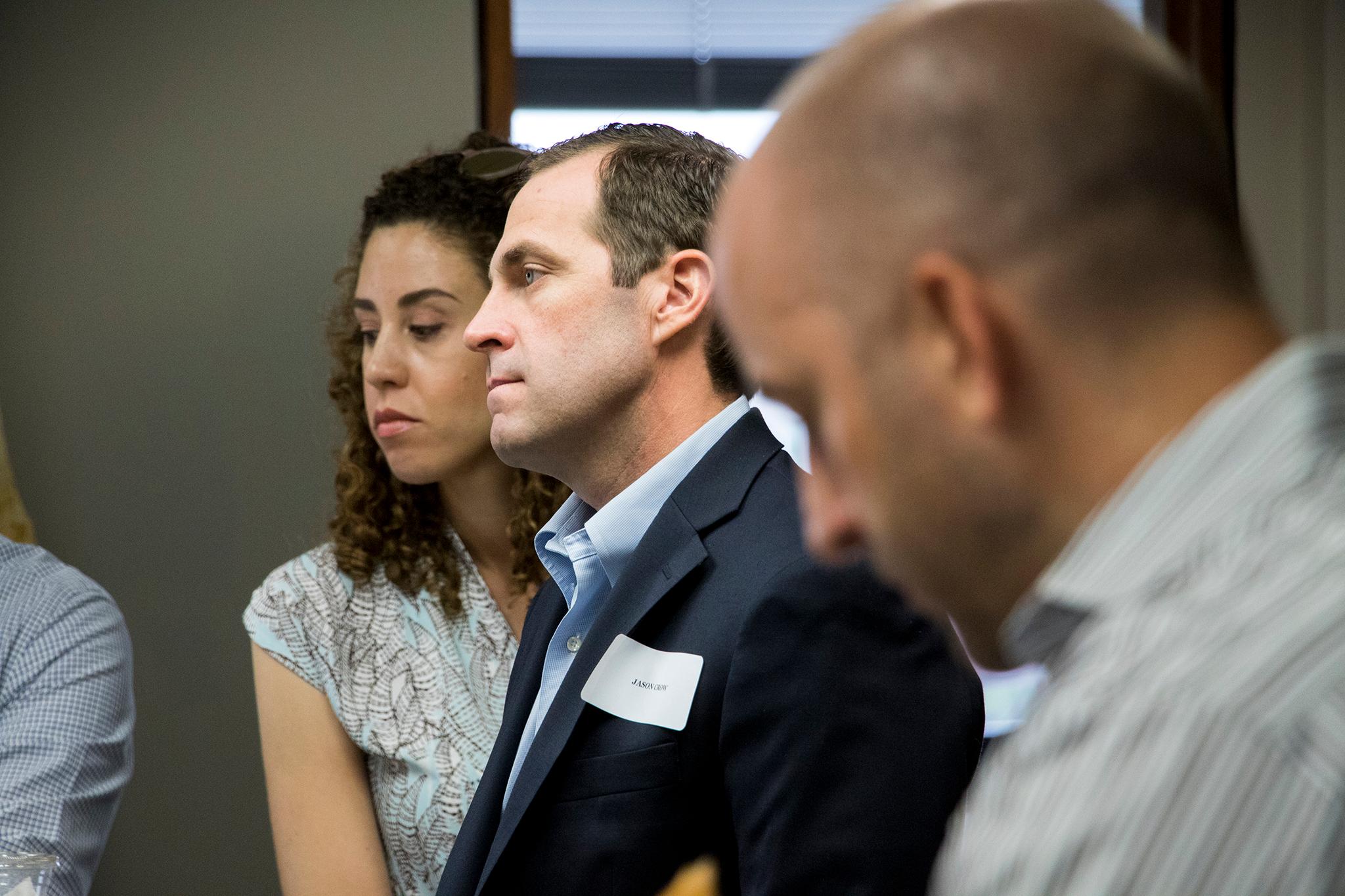Falling back to the slog of civilian life proved difficult for U.S. Army Corporal Lawrence Wagner. He came back to Colorado in 2006 after serving and struggled to transition not only into a new job, but a new life.
“You went from having a community to not having a community,” Wagner said. “You went from having a structured life to not having a structured life. And I think those are some challenges that veterans have when they’re transitioning out.”
Wagner said he would like to see more programs that help mentor other veterans, including ones like Patriot Boot Camp, which provide guidance for veterans seeking entrepreneurial ventures.
He was among the attendees for a veterans' discussion in Denver hosted by Democratic gubernatorial candidate Jared Polis, who helped co-found Patriot Boot Camp. Polis, who represents the 2nd Congressional District, was joined by fellow U.S. Rep. Seth Moulton of Massachusetts. The two heard suggestions and answered questions over issues impacting veterans.
“I think he is listening,” Wagner said. “I think like the gentleman said, we can get into more details on some of the experiences I went through so others don’t have to go through those kinds of experiences.”
Polis said he wants to make Colorado the best state for veterans. He said Colorado is home to more than 400,000 veterans he said deserve a range of resources from physical and mental health services to job training to mentorship programs.
“Something I hear over and over again, as a society, we need to better and just say ‘Thank you’ to those who defend our freedom, but also make sure that we as a society are there for you,” Polis said.
Polis said he wants to continue pushing for legislation giving veterans access to start-up capital, pushing for more job and skills training programs, ensuring they have access to "the full suite of high-quality health services that they have earned," and preventing a potential government shutdown that Polis said "plays political games with our national defense."
(It's worth noting his Republican opponent Walker Stapleton called Polis out after Polis voted against a pay raise for troops last month. Polis told the Colorado Springs Gazette's editorial board the decision had to do with preventing more debt.)

Moulton, a Democrat and former U.S. Marines officer, said after serving four tours in Iraq, he saw first-hand what he said was “consequences of failed leadership in Washington.”
“We need to do a better job of helping veterans get through the transition of coming out of the military, getting reintegrated back into our communities back here at home, where many of them do want to serve again,” Moulton said.
Also in the crowd Tuesday was Jason Crow, the Democratic nominee for the 6th Congressional District (and Moulton’s running partner earlier Tuesday). Crow is a combat veteran and former U.S. Army Ranger who is hoping to unseat Polis’ current colleague in Congress, U.S. Rep. Mike Coffman (who is also a veteran).
One issue brought up during the discussion: How can they work on improving the image veterans have among civilians?
Moulton laid out two dramatic contrasts for some veterans.
“When you think about what veterans contribute after you get home, it’s pretty extraordinary, that veterans historically have been disproportionately represented as Fortune 500 CEOs,” Moulton said. “And yet on the other side, veterans are also disproportionately homeless. So how does that happen?”
He added that while acknowledging conditions like post-traumatic stress disorder do affect veterans, people should not assume every veteran is “forever disabled” by PTSD. He said it’s a treatable condition that shouldn’t impact a veteran’s chances at post-service employment.
Polis said being able to “transport” the skills men and women develop when working under such stressful conditions could make them natural leaders.
“What employers need to realize is look, somebody who has been enlisted for four years, five years, they have amazing experiences, and probably in many ways, better experiences to prepare them for success in the future than somebody who had just been, let’s say lower-skills job for those same four, five years,” Polis said.

Mentoring other veterans can also be an important factor in improving their transition. Polis said Patriot Boot Camp has trained more than 700 entrepreneurs and their alumni have raised more than $70 million in capital and created more than 1,300 jobs for veterans and non-veterans.
Crow also touted the importance of mentoring fellow vets and not compartmentalize their prior experiences.
“Every vet in this room should be personally mentoring at least one other veteran, if not more,” Crow said. “Take that young man or woman under your wing, meet with them regularly, talk to them about the transition, talk to them about how to write a resume that people understand ... make sure they’re translating that experience effectively.”
Polis also wants to make medicinal marijuana for pain management more accessible to veterans.
Marijuana remains a Schedule I narcotic, which places all sorts of limits on how it can be researched by the feds, and by extension, by the Veterans Hospital. While Bills have been introduced in Congress to give VA more leeway in researching the drug's use for a medicinal purpose, Moulton said Colorado's law could end up being models for a broader nation-wide law.
Polis mentioned the federal barriers, though he would like to see more research completed. He said medicinal marijuana in Colorado has lower costs than recreational varieties.
“In the meantime, we should, of course, err on the side of access,” Polis said. “We would love to be able to provide those through the VA and I’ve offered amendments to do that. I think it’s only a matter of time before something like that is at least allowed.”













